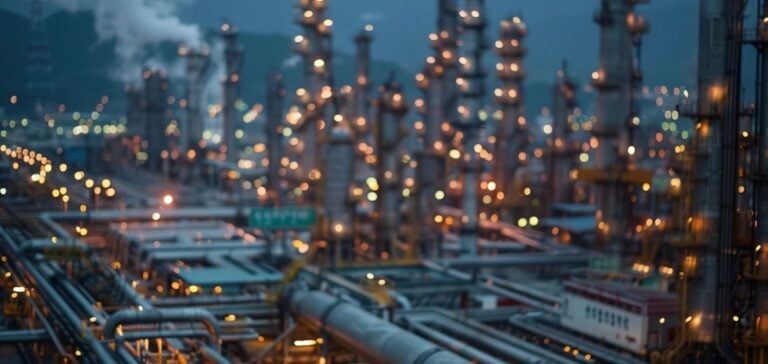The recent depreciation of the South Korean won against the dollar, reaching a multi-year low, is putting pressure on South Korean refiners as settlement costs for imported crude soar. This currency movement arises amid internal political unrest, exacerbating the fragility of the country’s financial markets.
Financial and logistical impacts
South Korea’s four main refiners – SK Innovation, GS Caltex, S-Oil, and Hyundai Oilbank – depend almost entirely on imports for their crude oil needs, making the dollar-won exchange rate a critical factor. According to industry sources, every 10-won increase in the exchange rate results in foreign exchange-related losses of $5 million to $10 million for these companies.
Currently, refiners are receiving shipments of medium-sour Middle Eastern crude that were negotiated months ago, at a time when exchange rates were more favorable. However, the sudden depreciation of the won has significantly inflated final bills. Teams specializing in oil derivatives and currency hedging are struggling to mitigate these unforeseen impacts.
The dollar-won exchange rate climbed to 1,436.26 won during the afternoon session on December 16, according to the Bank of Korea, compared to 1,403.96 won at the beginning of the month. This volatility increases pressure on refining margins, which are already strained by average import costs of $83.96 per barrel over the first ten months of the year, according to Korea National Oil Corp.
Political turmoil
The ongoing political crisis, marked by the declaration of martial law on December 3 and President Yoon Suk-yeol’s resistance to judicial investigation, has shaken investor confidence. Although Yoon’s impeachment was passed by the National Assembly on December 14, slow judicial processes and partial arrests of military and government officials prolong political instability.
Millions of South Korean citizens are demonstrating daily to demand the arrest of the president and his allies. While these protests remain largely peaceful, the perception of political risk undermines the stability of financial markets.
Outlook for the energy sector
Despite the tense political climate, the fundamentals of South Korea’s refining and oil trading industries remain robust. Refiners continue to meet the demands of their clients in Asia and Oceania while fulfilling supply contracts for petroleum products. However, refining margins remain under pressure due to currency volatility and political uncertainty.
Industry professionals hope for a swift resolution to the crisis and the establishment of a new governmental leadership structure. This transition is considered essential for restoring investor confidence and stabilizing South Korea’s financial markets, which are deeply interconnected with global supply chains.






















